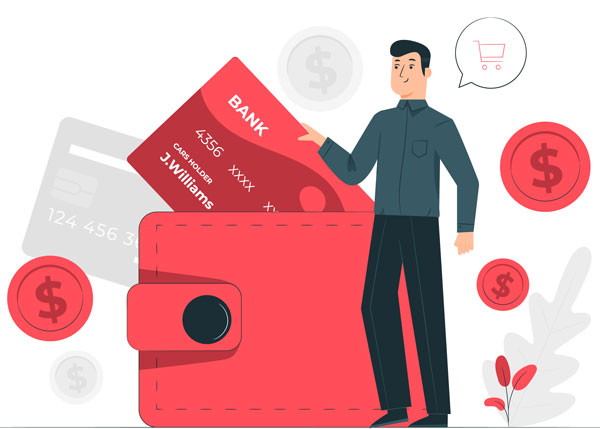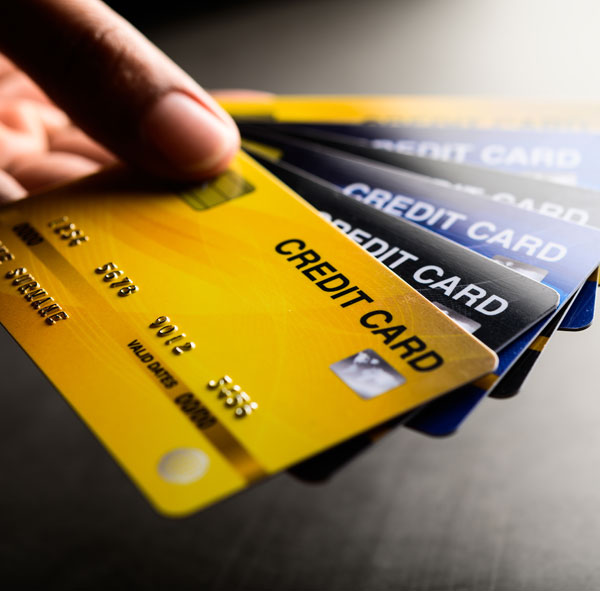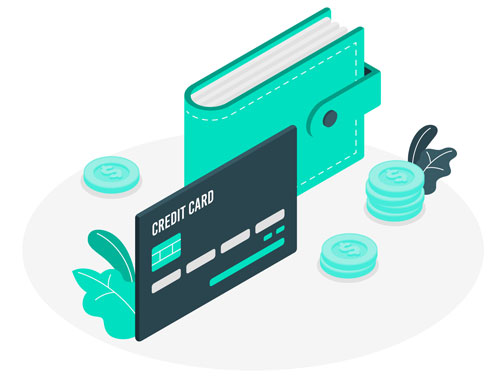A credit card is a financial instrument issued by banks with a pre-set credit limit, helping you make cashless transactions. The card issuer determines the credit limit based on your credit score, credit history and your income.
Once you get the credit card bill, you can repay the amount you have spent within a certain repayment period without any interest. After this grace period, interest is applied on your balance.
The key difference between a credit card and a debit card is that money gets deducted from your bank account when you swipe a debit card. In the case of a credit card, the money is taken from your credit limit.
You can swipe a credit card to make a payment online or offline for almost all products and services. After you apply for a credit card and begin to use it, make sure that the amount you have borrowed or utilised is repaid within the stipulated time frame to avoid penalty charges. Your credit card details are stored securely with the issuer. To avoid fraud, don’t share your credit card information with anyone.

Credit cards will offer you the following benefits -





There are tons of credit cards available these days, especially as India gears for a full-fledged cashless economy. However, not all cards that you see would help meet your needs. So, you need to figure out your requirements properly before choosing a credit card. Credit cards are broadly categorized into the following-
These cards offer cashback and rewards on spends. With cashback, the resultant cost of a purchase comes down, resulting in increased savings for the customers. Reward points, on the other hand, can be earned on spends. The rewards can be further redeemed for shopping at several online and offline stores. Here’s a list of top five cashback and rewards cards.
An avid traveller? Think of travel cards that offer miles on travel spends while also letting you chill at both domestic and international airport lounges. You can redeem the miles earned for travel ticket and hotel booking. Don’t wait, just choose any of these below you think is the best for you.
High fuel prices making it difficult for you to drive on the road? Don’t worry, there are fuel credit cards that earn you points on refilling your vehicle. You can even get discounts or cashbacks on refilling the vehicle at fuel stations. These top five premium credit cards (fuel) are up for grabs.
High fuel prices making it difficult for you to drive on the road? Don’t worry, there are fuel credit cards that earn you points on refilling your vehicle. You can even get discounts or cashbacks on refilling the vehicle at fuel stations. These top five premium credit cards (fuel) are up for grabs.
With so many credit card options available, it may get difficult for you to choose the right card. This is why the perfect starting point in choosing the best card is to understand your spending preferences and decide on the type of value-back you would want from the card. For instance, if you frequently shop online across many websites/platforms, you should look for a card that rewards all online expenses instead of one that specifically offers co-branded privileges with, say, Amazon.
What are your options (especially if you are new to credit)?
Do you already have a credit card?
What type of value back do you want- rewards, cashback or air miles?
On what type of purchases would you want the highest value back?
Do you favor a certain airline, online shopping platform or brand?
Would you be willing to pay a certain amount as annual fee if the card comes with the right set of benefits to suit your requirements?
Are you a heavy spender and would be able to meet the spending threshold to avail fee waiver or milestone benefits?

You should be at least 18 years of age at the time of application.
You must not be more than 65 years old by the time you apply credit card online.
Salaried must have an annual income of at least INR 2 lakhs. On the other hand, self-employed must be earning a minimum of INR 1.5 lakh to get the approval.
The credit score must be 750 and above for a hassle-free approval
You should first check with the lender whether the income sought for a credit card is on a gross or net basis. Also, note that banks generally consider the fixed income for approving the application. The fixed income does not include the incentives and other variables earned by an individual. So, see whether the fixed income equals the amount needed to gain an approval. If so, then you can apply. If not, then look for banks that can offer you a credit card based on your fixed income.
Example - Robi applies for a credit card at a bank which considers gross fixed income to approve or reject the application. The income requirement is INR 5 lakh a year. Income particulars of Robi for 1-year period is shown below.
Keeping this in mind, Robi's application would be rejected even as the income including incentives is above the amount of INR 5 lakh as sought. He must earn a minimum gross fixed monthly income of INR 41,667 to gain an approval.
The documentation requirement also varies from issuer to issuer. Some of the key documents required to apply for a credit card are as follows:
Identity and Signature Proof- Passport, PAN card, Driving License, Voter ID card, Aadhaar card, employee identity card in case of government employees.
Address Proof- Bank statement, Rent Agreement, Voter ID card, Ration card, Passport, Driving License, telephone/ electricity/ water/ credit card bill or Property tax.
Age Proof- Voter ID card, Secondary School Certificate (class 10), birth certificate, Passport, Aadhaar Card, pension payment order or Receipt of LIC policy.
Income proof for Salaried Individual- Latest 3 months’ salary slips, Salary account bank statement for six months.
Income proof for Self-employed Businessmen/Professionals- Latest IT Returns with computation of income and other certified financial documents along with business continuity proof.
After glancing at the reward points, cashback and other benefits, it's time to apply for the card online at GrowMudra, a neutral marketplace for loans and other financial products. There are Many ways by which you can apply here. All three are described below for you to look at.
Apply via Filling Form

You can visit the website of GrowMudra and choose from the conventional application form to apply.

You can apply for the card in a few minutes by answering or filling relevant personal and professional information.
If you have submitted the details correctly and meet the eligibility criteria, an instant approval will remain a formality!

You can compare exciting offers in terms of reward points, travel privileges, fees, etc. A good comparison helps you choose the best deal that would not only match your needs but also let you live with style.

The information displayed is researched thoroughly and get updated on a timely basis, hence ensuring a greater degree of reliability.

Not only the offers, you can also get to know the applicable fees & charges. The information is transparent, so you can get a complete detail before applying for the card. This only boosts consumer confidence and has made many applying through GrowMudra.

You can also visit the nearest branch with the required documents to apply for the credit card. The documents are already mentioned above. So, take note of that. There, you need to ask for the credit card application form. Fill the details asked in the form before submitting the same along with the documents to the branch official. The bank would check the application form and documents thoroughly and give an approval only when the details are verified successfully.
You can check the application status online in a few minutes. The process involves the following steps.
In case you face a rejection, the reasons for the same would be mentioned too. If you can fill those voids, do so and have a credit card apply again for an approval.
The statement is a document showing the payment date, the amount due, minimum due, the list of transactions, rewards summary, etc. The late payment charges, if any, would also be shown in the statement. You can check the statement on your email ID as well as get the same on your registered address.
If you check the statement carefully, you can detect some possible errors. The bank can commit an error, and as a result, the outstanding balance will rise erroneously. If you find an error, report the same to the bank at the earliest for correction.

Internet banking
Mobile banking
Payment gateway
Cash or demand draft deposit at bank branch

You can pay using the net banking or mobile banking access of the concerned bank.
If you have the net banking or mobile banking access of other banks. you can follow the steps described below to pay your bills.
You can use the payment gateway to pay the bill. Choose from any of debit card and internet banking options to pay the dues.
Helps in building a good credit score
Interest-free credit period of up to 45 days
Hassle-free transactions both online and offline
Comes with excellent rewards, cashback, discounts, offers, etc.
Handy in emergency financial situations
To make big-ticket purchases and pay later in easy EMIs
All transactions are secure as they need OTP & PIN authentication
Credit cards give you access to short-term credit without any collateral. The issuers assigns a credit limit, which is the maximum amount you can spend using the card. When you use your card to make a purchase, the amount gets deducted from your available credit limit and you are required to pay it back by the next due date or convert it into EMI and spread it over the next few months.
Credit cards also come with interest charges but they are applicable only when you do not pay your dues in full. If you pay the total amount due in full and on time, you do not incur any extra charges. Even if you pay the minimum amount due, the unpaid balance will still incur finance charges which typically range from 30% p.a. to 45% p.a., or even higher in some cases.
Most credit cards reward you for using the card by giving you cashback, reward points, air miles, and several other complimentary privileges.
Most credit cards offer reward points on every purchase. The rate of earning these rewards differs from card to card and also from one purchase to another. For example, SBI Card PRIME offers 2 reward points for every Rs. 100 spent on the card but for the same amount spent on dining, movies, groceries and departmental store, you will get 10 reward points. You can accumulate these points and redeem them to get vouchers, merchandise or direct cash credit into your statement. Instead of regular reward points, some credit cards offer air miles or cashback.
Credit cards come with an interest-free period of around 45 days, before you are required to clear the dues. This is the duration between the date of making the purchase and the day when the bill is due. You will not have to pay any interest (also known as finance charges) on your credit card as long as you pay the total amount due by the due date.
However, if you pay only the minimum due and carry the balance to the next cycle, interest starts accruing on the unpaid balance. At the same time, new purchases on the card also become ineligible for the interest-free period. This is reason why even a small unpaid balance on your credit card can turn into a debt spiral.